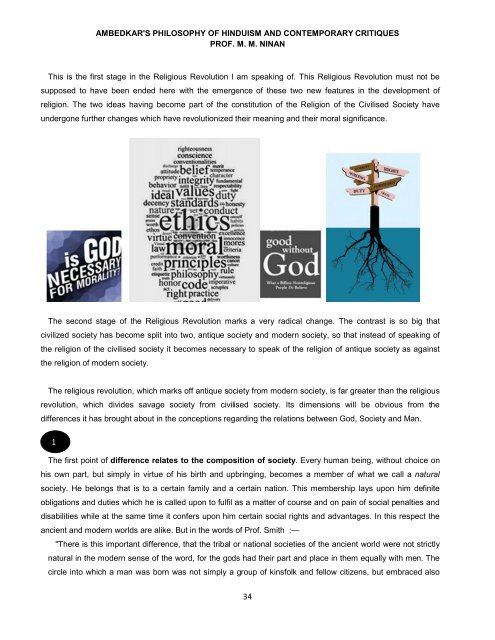Ambedkar-Philosophy of Hinduism
You also want an ePaper? Increase the reach of your titles
YUMPU automatically turns print PDFs into web optimized ePapers that Google loves.
AMBEDKAR'S PHILOSOPHY OF HINDUISM AND CONTEMPORARY CRITIQUES<br />
PROF. M. M. NINAN<br />
This is the first stage in the Religious Revolution I am speaking <strong>of</strong>. This Religious Revolution must not be<br />
supposed to have been ended here with the emergence <strong>of</strong> these two new features in the development <strong>of</strong><br />
religion. The two ideas having become part <strong>of</strong> the constitution <strong>of</strong> the Religion <strong>of</strong> the Civilised Society have<br />
undergone further changes which have revolutionized their meaning and their moral significance.<br />
The second stage <strong>of</strong> the Religious Revolution marks a very radical change. The contrast is so big that<br />
civilized society has become split into two, antique society and modern society, so that instead <strong>of</strong> speaking <strong>of</strong><br />
the religion <strong>of</strong> the civilised society it becomes necessary to speak <strong>of</strong> the religion <strong>of</strong> antique society as against<br />
the religion <strong>of</strong> modern society.<br />
The religious revolution, which marks <strong>of</strong>f antique society from modern society, is far greater than the religious<br />
revolution, which divides savage society from civilised society. Its dimensions will be obvious from the<br />
differences it has brought about in the conceptions regarding the relations between God, Society and Man.<br />
1<br />
The first point <strong>of</strong> difference relates to the composition <strong>of</strong> society. Every human being, without choice on<br />
his own part, but simply in virtue <strong>of</strong> his birth and upbringing, becomes a member <strong>of</strong> what we call a natural<br />
society. He belongs that is to a certain family and a certain nation. This membership lays upon him definite<br />
obligations and duties which he is called upon to fulfil as a matter <strong>of</strong> course and on pain <strong>of</strong> social penalties and<br />
disabilities while at the same time it confers upon him certain social rights and advantages. In this respect the<br />
ancient and modern worlds are alike. But in the words <strong>of</strong> Pr<strong>of</strong>. Smith :—<br />
"There is this important difference, that the tribal or national societies <strong>of</strong> the ancient world were not strictly<br />
natural in the modern sense <strong>of</strong> the word, for the gods had their part and place in them equally with men. The<br />
circle into which a man was born was not simply a group <strong>of</strong> kinsfolk and fellow citizens, but embraced also<br />
34


















